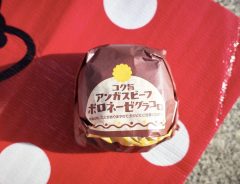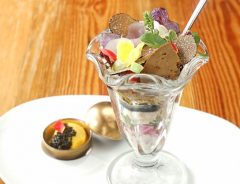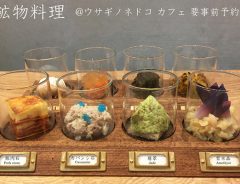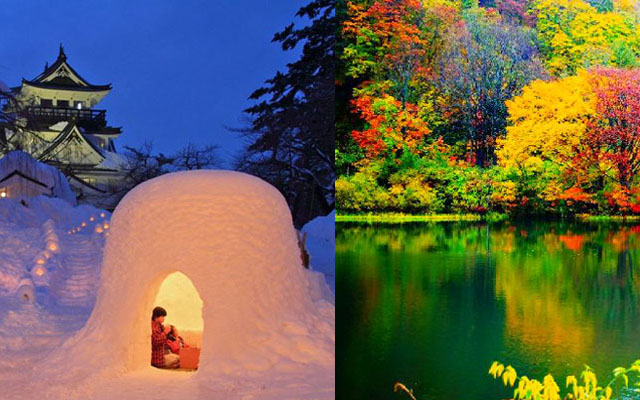- Source:
- Nishi Kien / Rakuten / Ibaraki Guide / Jordy Meow / F-Pedia / 思い出・・五色沼・元滝の何と美しい(ぶらり一人旅 東北三県編)
Related Article
-

Japanese IT Company Pays Employees “Cat Compensation” To Take Care Of Rescue Kitties
-

Trying out McDonald’s Japan’s new Rich Umami Angus Beef Bolognese Gurakoro croquette burger
-

Three Greatest Delicacies Of The World Join Forces To Create Luxurious Savory Parfait
-

Explore The Wondrous World Of Rocks And Minerals Eating Jars Of Edible Specimens
-

Harajuku Store Offers Poop Emoji Ice Cream Served In Miniature Japanese Style Toilets
-

Denim is considered old fashioned?! What else are young people in japan losing interest in?



If you asked someone where to travel to in Japan, you would no doubt be presented with a list of "must see" spots--the hustle and bustle of Tokyo and Osaka, or the traditional charm of the shrines and temples in Kyoto. However, for many, these must see spots may fall under the umbrella of "been there, done that", and are often very crowded with other tourists. In that case, you may be searching for a new type of experience in Japan--perhaps one that even Japanese people would consider different.
For that purpose we've compiled a list of 5 lesser traveled roads for those looking for a different type of adventure in the Land of the Rising Sun. While popular in their own right, they don't immediately spring to mind to most tourists (and even Japanese people), but will definitely provide for a memorable experience!
Kamakura Snow Huts (Akita)
Source: Rakuten
Source: Nishikien
An icy tradition in the northern parts of Japan, you may want to head to Akita prefecture to experience your own personal winter wonderland. Originally used to offer prayer to the water god, these snow huts have now become popularized by festivals and unique camping options. The interior of a Kamakura hut is actually quite warm, with some of the bigger structures being able to fit up to 10 adults. Inside you can enjoy traditional Japanese cooking such as nabe (hot-pot) or the warmth of amazake (sweet, low-alcohol sake). It's definitely a great place for snow lovers in Japan. Yamagata's Kamakura festival is one such opportunity, but you can find these huts in most snowy locations.
Goshiki-numa (Fukushima)
Source: blogs.yahoo.co.jp
Source: Jordy Meow
Goshiki-numa (five colored lakes) are a cluster of five lakes centered around the volcanic (dormant) Mt. Bandai in Fukushima prefecture. The volcano erupted in the 1800's and the minerals from the eruption have added to the different colors of the water. Each lake offers an awesome canvas to reflect the gorgeous scenery of each season with its own unique hue of color. For those interested in hiking, or simply taking in a the beauty of nature, this is a spot recommended for any time of year.
Taketomi Island (Okinawa)
Source: Jordy Meow
Source: Jordy Meow
Source: Jordy Meow
Okinawa is a truly beautiful area that provides for a wonderfully tropical setting and much different atmosphere than the rest of Japan. While the often-visited Naha area and Kokusai-dori (International Street) will give you a great taste of city life with an island pace, it's the beaches of the smaller islands in particular that will make you feel as if you have stepped into a different country within Japan.
Taketomi Island is an island of around 300 inhabitants that is popular for its pristine beaches, and water-buffalo rides where you can enjoy traditional Okinawan music. The red-tiled rooftops and turquoise waters make for a great day-trip from Okinawa proper, allowing you to really soak in the great flavor of Okinawan culture while getting in a bit of serenity and isolation as well.
The Seven Waterfalls of Kawazu (Shizuoka)
Source: Jordy Meow
Source: Jordy Meow
Shizuoka prefecture is home to Mt. Fuji and boasts luscious green scenery all throughout the year, making the Kawazu Nanadaru (Kawazu Seven Waterfalls) a fantastic spot to observe the pure natural beauty of the prefecture. You can encounter the waterfalls, which range from 2 meters to 30 meters in height, along a leisurely hiking trail. You'll also find a series of statues that tell the short story of "Izu no Odoriko"(The Izu Dancer) by Kawabata Yasunari. Even better is that at the base of trail you can find a lovely ryokan (traditional Japanese inn) and hot spring to rest up at. This is a spot that really instills you with the feeling of "I'm in Japan!"
Hitachi Seaside Park (Ibaraki)
Source: Jordy Meow
Source: Jordy Meow
While it has gained popularity in recent years, the Hitachi Seaside Park offers a dazzling alternative to the traditional viewing of autumn leaves in Japan (koyo). The large cluster of plants pictured above are called kochia. They are a brilliant green until late September, when they turn to the eye-widening shade of red that attracts visitors from all over the country. If you miss the autumn season, don't worry, because things look just as pretty in the Spring!
Source: Ibaraki Guide
Special thanks to Jordy Meow, whose photography can be found at his website, Totoro Times. If you remember, Jordy Meow's photography was featured in our haikyo article. His book, Abandoned Japan, is now published and available on Amazon for order, and features tons of great photography around Japan!